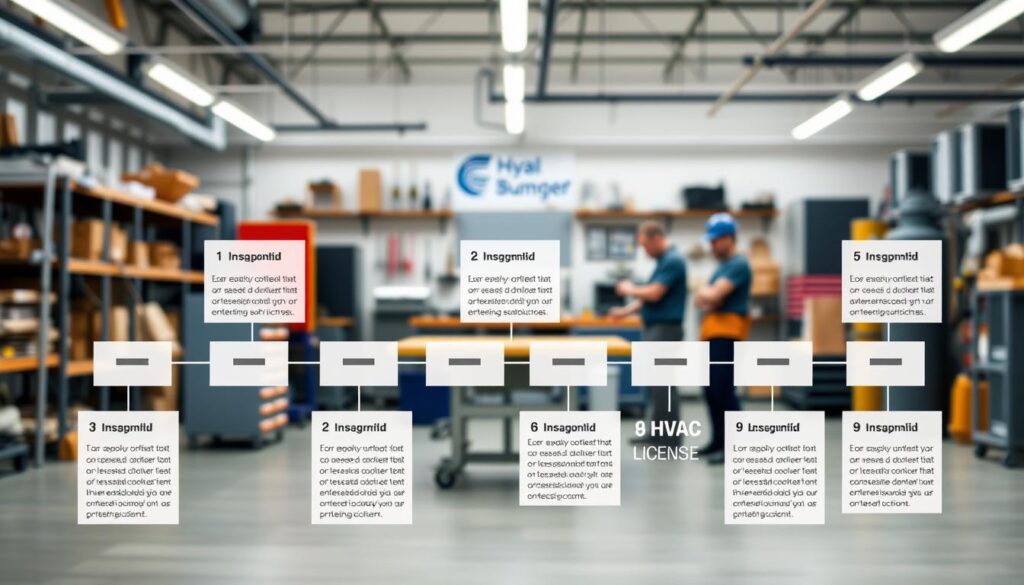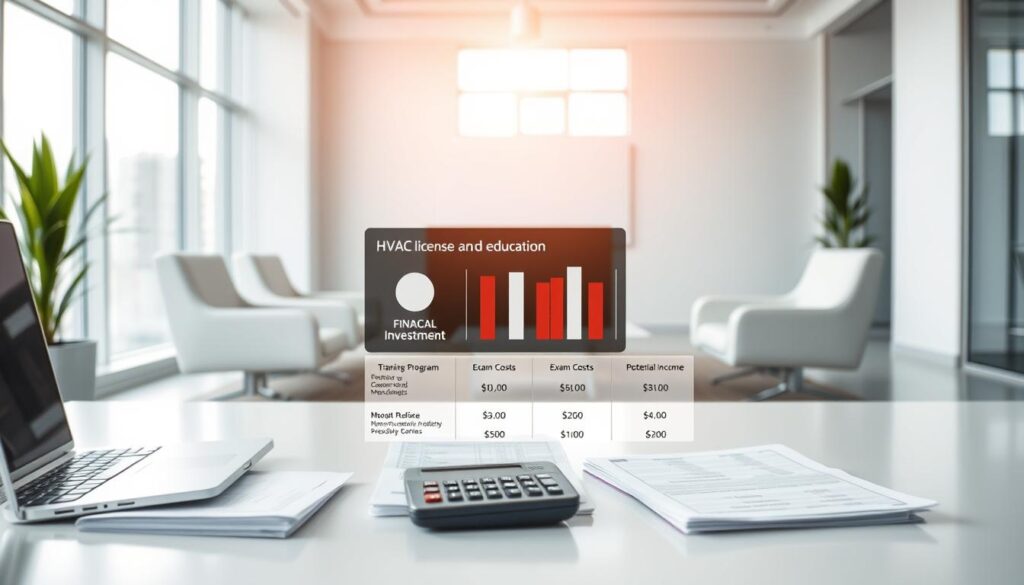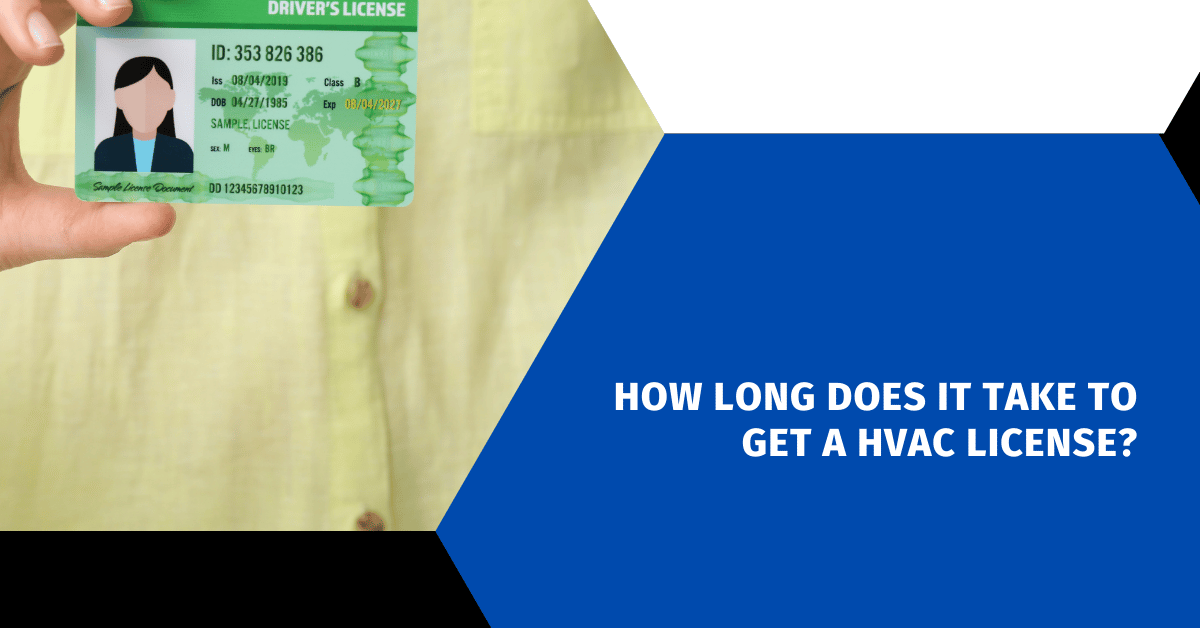How Long Does It Take to Get a HVAC License?? Ever wondered what stands between you and a successful career in the heating, ventilation, and air conditioning industry? The journey to get an HVAC license can seem complex. But understanding the process is your first step toward a rewarding career.

With over 415,800 HVAC mechanics and installers nationwide, the industry offers promising opportunities. The national employment growth projection of 6% from 2022 to 2032 means more than 20,000 skilled workers will be needed. This makes now an ideal time to explore how long it takes to get an HVAC license.
HVAC licensing requirements vary by state and locality, creating a unique challenge for aspiring technicians. Each jurisdiction has its own set of rules. This makes the path to becoming a licensed professional both exciting and complex.
Key Takeaways
- HVAC licensing timelines can range from 6 months to 2 years
- Apprenticeships typically take 4-5 years to complete
- Certification can significantly impact career advancement
- Educational programs provide essential foundational knowledge
- State-specific requirements play a critical role in licensing
Table of Contents
Understanding HVAC Licensing Requirements
Getting into the HVAC field can be tricky, but knowing the rules is key. Most places need certain licenses to work in heating, ventilation, and air conditioning.
The process to get an HVAC license has several parts that change by area. Even though rules vary by state, some basics stay the same:
- High school diploma or equivalent
- Certified HVAC technology courses
- Practical work experience
- Successful completion of licensing examinations
State vs Local Licensing Dynamics
Your HVAC license path depends on state and local laws. Some states have broad statewide rules, while others let local areas set their own rules. For example, Colorado lets local areas add extra rules on top of state ones.
Basic Eligibility Criteria
To start on the HVAC licensing path, you’ll need to meet these basic steps:
- Be at least 18 years old
- Possess a valid government-issued ID
- Complete required educational training
- Accumulate supervised work experience
- Pass background checks in some places
Types of HVAC Licenses Available
HVAC licenses come in different types. Each area has its own set, like:
- Apprentice License
- Journeyman License
- Master HVAC Technician License
- Specialty Refrigeration License
Knowing these details helps you move through the licensing process smoothly. It sets you up for a great career in HVAC.
Educational Pathways for HVAC Licensing
Getting an HVAC license means choosing the right educational path. Your path to becoming a certified HVAC pro has many options. These choices can guide your career.
HVAC education programs offer different ways to reach your licensing goals. You can pick from various educational paths. They fit different learning styles and schedules:
- Vocational or Trade School Programs (6-12 months)
- Associate Degree Programs (2 years)
- Certificate Programs (6 months)
- Diploma Programs (1 year)
- Apprenticeship Programs (3-5 years)
The length of HVAC training varies by path. Trade school programs are the shortest, lasting 6-12 months. They focus on practical skills needed for HVAC certification.
Associate degree programs offer a deeper education. These two-year programs mix theory with hands-on training. They prepare you for HVAC’s technical challenges.
Apprenticeship programs are the longest option. They last 3-5 years. They combine classroom learning with on-the-job training. This way, you learn while earning, gaining experience and knowledge.
Choose an educational path that fits your career goals, time, and budget. Each path has its benefits for a successful HVAC career.
Required Work Experience and Training Hours
To start an HVAC career, you need to put in the work and training. You’ll go through apprenticeships and supervised work. These steps help you learn the skills and knowledge needed.
The HVAC apprenticeship is tough but worth it. You’ll spend a lot of time learning hands-on and gaining professional knowledge.
Apprenticeship Program Structure
HVAC apprenticeships offer a clear learning path. They last 4-5 years and include:
- 1,230 hours of classroom instruction
- 10,000 hours of hands-on training
- Supervised work experience with licensed professionals
- Comprehensive skill development across various HVAC systems
On-the-Job Training Requirements
Practical experience is key in HVAC. Most states require a lot of on-the-job training. Apprenticeships offer a chance to learn in real-world settings with expert guidance.
Supervised Work Experience
Working under supervision is vital for your growth. Apprentices work with licensed techs. They learn about industry standards, safety, and advanced skills.
Professional development in HVAC requires dedication, technical knowledge, and continuous learning.
HVAC jobs are growing 6% from 2022 to 2032. This means over 20,000 new jobs. With the right training and experience, you’ll be ready for a fulfilling HVAC career.
Explore Our HVAC Shop
Looking for top-rated HVAC tools, parts, and accessories? Visit our shop and find the perfect solution for your needs.
Visit the ShopHow Long Does It Take to Get a HVAC License?
Getting an HVAC license is a journey that takes time. It depends on your career path and where you live. The time it takes can be from a few months to two years.
Here are the main steps to get an HVAC license:
- EPA 608 Certification: 1-2 weeks
- Technical Training: 6-24 months
- Apprenticeship: 4-5 years
- State Licensing Exam: 3-4 hours
Several factors affect how long it takes to get a HVAC license. Most places need at least four years of work experience for a Master’s license. Your journey might include:
- Finishing an accredited HVAC program
- Getting practical work experience
- Passing needed certification exams
- Meeting state-specific licensing rules
The cost to get an HVAC license is about $530. This includes fees for application, licensing, and exams. This money covers your first license and exam costs.
| Certification Stage | Typical Duration | Estimated Cost |
|---|---|---|
| EPA 608 Certification | 1-2 weeks | $20-$150 |
| Technical Training | 6-24 months | $1,200-$15,000 |
| Apprenticeship | 4-5 years | Varies |
| Licensing Exam | 3.5 hours | $330 |
Your hard work and commitment will speed up your HVAC licensing. Focus on your training and meet all state rules to start your HVAC career.
Explore Our HVAC Shop
Looking for top-rated HVAC tools, parts, and accessories? Visit our shop and find the perfect solution for your needs.
Visit the ShopHVAC Certification and Examination Process
Getting your HVAC certification takes planning and knowing the steps. You’ll need to pass several tests to show you’re skilled in HVAC work.
The first step is to meet licensing rules, which differ by state. Your prep should cover a few key areas:
- EPA Section 608 Certification
- State-specific licensing exams
- Technical knowledge assessments
- Practical skills verification
EPA Section 608 Certification
The EPA requires HVAC techs to have specific certifications for working with refrigerants. There are four main types:
| Certification Type | Appliance Category | Exam Cost |
|---|---|---|
| Type I | Small appliances | $20-$50 |
| Type II | High-pressure appliances | $75-$100 |
| Type III | Low-pressure appliances | $75-$100 |
| Type IV (Universal) | All refrigeration systems | $100-$150 |
State-Specific Exam Requirements
Each state has its own rules for HVAC licenses. For example, California needs 4 years of experience. Your timeline will depend on these state rules.
Testing and Application Procedures
Get ready for your exams by:
- Studying technical materials well
- Documenting your practical experience
- Passing both written and practical tests
- Turning in all needed application documents
Pro tip: Check with your state’s licensing board for specific exam locations and prep resources to make your certification easier.
Explore Our HVAC Shop
Looking for top-rated HVAC tools, parts, and accessories? Visit our shop and find the perfect solution for your needs.
Visit the ShopCost and Investment Requirements

Getting an HVAC license needs careful planning. The cost of hvac education programs can change a lot. It can be from $500 to over $20,000, based on your path.
There are several key costs to think about:
- Educational Program Costs:
- Certificate Programs: $1,200 – $15,000
- Associate’s Degree: $15,000 – $35,000
- Apprenticeship Programs: $500 – $2,000
- Additional Expenses:
- Books and Supplies: $500 – $1,000 annually
- Tools and Uniforms: $600 – $800
- Certification Exams: $40 – $240 per section
HVAC licensing costs include different fees. In California, for instance, a license fee can be up to $180. Renewal fees are usually between $50 to $150 a year.
| Expense Category | Cost Range |
|---|---|
| HVAC Certificate Program | $1,200 – $15,000 |
| EPA Certification Exam | $40 – $240 |
| State Licensing Fee | $100 – $300 |
| Annual License Renewal | $50 – $150 |
Tip: Look into financial aid, scholarships, and employer tuition reimbursement to lower your hvac licensing costs.
“Investing in your HVAC education is investing in a stable, growing career with significant earning power.” – HVAC Industry Expert
Career Opportunities and Salary
The HVAC industry is full of exciting career paths with lots of room to grow. You can work in homes, businesses, or factories. Knowing the hvac certification timeline helps you plan your career well.
Entry-Level Positions
At the start of your HVAC career, you’ll find several entry-level jobs:
- HVAC Apprentice
- HVAC Helper
- Maintenance Technician
These jobs need little experience and offer great learning chances. You can start with a salary around $22.47 per hour.
Advanced Career Paths
With more experience, you can move up to more specialized roles:
- Residential Service Technician
- Commercial Service Technician
- Project Manager
- HVAC Contractor
Earning by Experience Level
| Experience Level | Hourly Rate | Annual Salary |
|---|---|---|
| Entry-Level (0-1 years) | $22.47 | $46,740 |
| Mid-Level (3-6 years) | $27.65 | $57,510 |
| Senior-Level (7+ years) | $32.83 | $68,280 |
The Bureau of Labor Statistics says the HVAC industry will grow by 19,000 jobs by 2030. This shows strong growth and great career chances for skilled workers.
Explore Our HVAC Shop
Looking for top-rated HVAC tools, parts, and accessories? Visit our shop and find the perfect solution for your needs.
Visit the ShopMaintaining and Renewing Your HVAC License

Keeping your HVAC license up to date is key for your career in the heating, ventilation, and air conditioning field. The process needs you to keep learning and follow industry rules.
States often ask for certain things to renew your license. This ensures you stay sharp and up-to-date. Here’s what you need to know:
- Renewal usually happens every 2-3 years
- Finish required continuing education hours
- Pay renewal fees on time
- Submit needed documents
Continuing education is a big part of keeping your license. Many states want HVAC pros to:
- Get 8 hours of general continuing education
- Learn 1 hour about state laws
- Update technical skills
When to renew is important to avoid fines. Here’s what’s best:
- Renew 30-60 days before it’s due
- Avoid late fees
- Keep your license active
| Renewal Period | Typical Requirements | Potential Consequences |
|---|---|---|
| Standard Renewal | Complete CE hours, pay fee | Continued license status |
| Late Renewal (30-90 days) | Additional fees apply | Late processing fee |
| Expired Over 1 Year | Reapplication required | Potential full reexamination |
Renewing online is easy. Most states let you renew anytime online. Stay on top of renewal dates and needs to keep your HVAC career going strong.
State-Specific HVAC Licensing Requirements
Understanding hvac licensing requirements can be tricky. Each state has its own rules for HVAC workers. It’s key for those wanting to work legally in their state to know the hvac licensure process.
State rules for HVAC licenses vary a lot. Some states have few rules, while others have strict ones.
- States without state-level licensing:
Colorado, Illinois, Indiana, Kansas, Maine, Missouri, New Hampshire, New York, South Dakota, Vermont, and Wyoming - States with detailed licensing rules include:
California, Texas, Florida, Alabama, and Arizona
Now, let’s look at some specific state rules:
| State | Experience Requirements | License Types |
|---|---|---|
| Texas | 4 years practical experience | Class A and Class B licenses |
| Florida | Varies by education and experience | Class A, B, and C licenses |
| California | 4 years experience in preceding 10 years | Contractor License |
When you’re getting an HVAC license, check your state’s rules. Important things to think about include:
- Minimum work experience
- Educational needs
- Exam requirements
- Insurance and bonding
The U.S. Bureau of Labor Statistics says the HVAC field will grow 4% by 2029. Knowing the licensing rules is more critical than ever for those starting out.
Explore Our HVAC Shop
Looking for top-rated HVAC tools, parts, and accessories? Visit our shop and find the perfect solution for your needs.
Visit the ShopTips for Accelerating Your HVAC Licensing Process
Getting your HVAC license can be tough, but with the right plan, you can speed up the process. By using smart ways to learn and get certified, you can cut down on your training time.
Here are some top tips for quick HVAC license prep:
- Look for fast training programs that pack more into less time
- Use online and evening classes for learning on your own schedule
- Find apprenticeships with full training
- Buy top-notch study guides and practice tests
Many schools now have quick HVAC courses. For example, some tech schools offer certification in just 18 months. This is much faster than the usual two years.
To make your HVAC license prep easier, try these steps:
- Make a study plan and stick to it
- Join study groups
- Use online tools and practice tests
- Get advice from seasoned HVAC pros
| Strategy | Potential Time Savings |
|---|---|
| Accelerated Training Programs | Up to 6-12 months |
| Intensive Study Techniques | 3-6 months reduction |
| Prior Experience Credit | Up to 1 year expedited |
Pro tip: Boost your learning by mixing different strategies and keep your eye on your career goals.
Conclusion: Is an HVAC License Worth the Time Investment?
Starting an HVAC career needs dedication and careful planning. Knowing how long it takes to get a license helps you decide on your future. The effort you put in can open doors to many career chances in a booming field.
The U.S. Bureau of Labor Statistics says HVAC jobs will grow by 6%. Getting certified, doing an apprenticeship, and getting licensed can take 2-5 years. This time includes school, work experience, and passing exams.
Getting an HVAC license brings big benefits. You’ll learn new skills, have a stable job, and earn well. Apprentices start at $26,000 to $43,000 and can move up, making your investment worth it.
Staying committed to learning and improving your skills is key to success. The HVAC world values those who keep learning and keep up with new tech.

